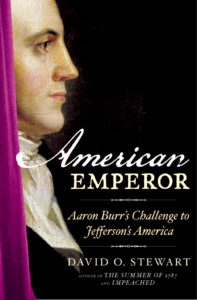Great Early Reviews for "American Emperor"
Though the book is still three months away from the bookstores, two early reviews for American Emperor are gratifying. In today’s Kansas City Star, Professor Glenn Altschuler of Cornell University calls the book a “compelling, provocative” portrait of Aaron Burr. He also write:
“In American Emperor David O. Stewart, a lawyer practicing in Washington, D.C., and the author of The Summer of 1787, examines Burr’s audacious attempt to form a new empire on the shores of the Gulf of Mexico ‘that would rival or even dwarf the United States.’
“A skilled historian and a splendid storyteller, Stewart makes the most of the episode and its compelling cast of characters. Stewart’s Burr is an American Satan with feet of clay. A rogue and a rake, he ‘fouled the punch bowl’ rather than revering the Founding Fathers.”
And in the Library Journal for July 15, Brian Odom wrote:
“While most assessments of the life of Aaron Burr (1765 1836) center on the disputed presidential election of 1800 and his deadly duel with Alexander Hamilton in 1804, Stewart (The Summer of 1787) provides an outstanding account concerned primarily with Burr’s suspicious western exploits thereafter and his subsequent trial for treason. Burr’s trial played out on a national stage, included an impressive cast of characters from Chief Justice John Marshall to the traitorous Gen. James Wilkinson, and ultimately provided federal courts with a procedural definition of treason. Drawing on his experience in constitutional law, attorney Stewart explains how such an iconic character, standing outside the reign of power, could provoke “generations of speculation and wonder.” His gripping narrative reveals a founder driven by ambition, with a passion for expansion into Central and South American. VERDICT Stewart’s sympathetic but unapologetic study of the enigmatic Burr . . . transcends its subject in exposing the frailty of early America’s westward ambitions. Highly recommended for readers of Revolutionary-era biographies and early U.S. history.”
